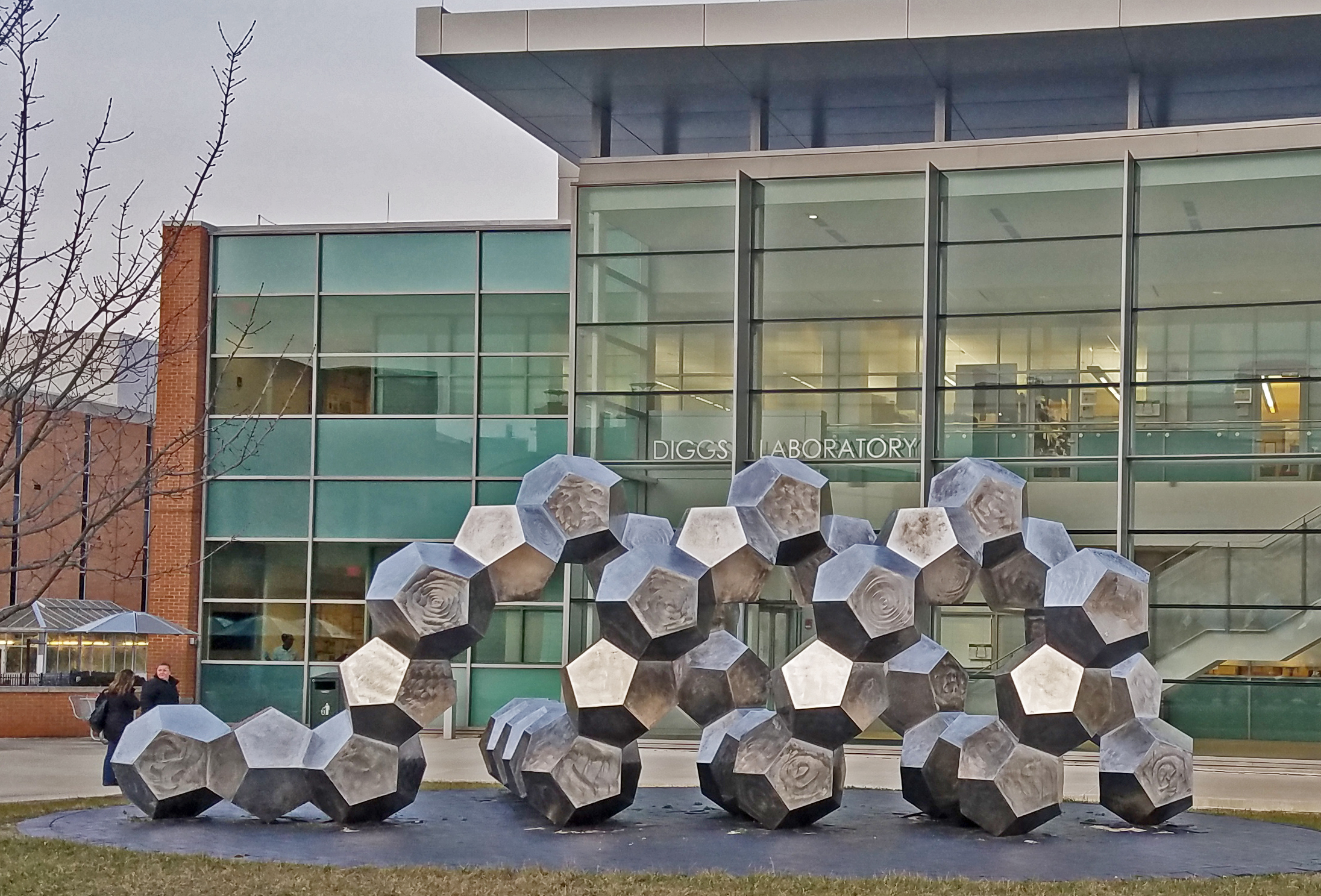
Double Helix sculpture outside Diggs Lab, WSU. Photograph: Michael Krieger/The Guardian
As the fall semester begins for Wright State University, some students may experience the physical, mental and academic struggles related to stress. Here is what stress is and resources for those experiencing it.
Impacts of stress
The World Health Organization defines stress as any change that causes strain on the body physically, emotionally or psychologically. The toll stress takes varies from person to person.
Physical
Stress, when experienced in different magnitudes, can impact the human body physically. There exist both acute and chronic stressors that occur to different extremities, according to Dr. Debra Steele-Johnson, professor and chair of the psychology department at WSU.
Steele-Johnson explained that daily hassles such as taking an exam, experiencing frustration while driving or juggling school with work, when experienced with enough frequency, can manifest in the physical body.
“Effects on the body can be quite diverse,” Steele-Johnson said. “Nausea, or digestion problems, headaches, it can even show up in your body as aches and pains. Fatigue is another big one.”
Senior English major Heidi Ames echoed experiences with these symptoms.
“I find myself struggling to fall asleep, stay asleep, and get enough sleep,” Ames said.
Other physical reactions to stress can include headaches, racing heart rate, exhaustion and clenched jaw, according to associate director of Counseling and Wellness Services Dr. Daniela Burnworth.
Additional physiological symptoms of stress are changes in blood pressure, respiratory rate and blood flow, according to a 2018 study in the Biomedical and Pharmacology Journal.
Mental
Not only does stress affect the body physically, it also affects the body mentally.
According to Burnworth, mental ramifications of stress include irritability, worry, sadness and isolation. These symptoms can be exacerbated when experienced for a long period of time.
“Long-term stress can contribute to harmful wear and tear on the body and weaken our immune system,” Burnworth said.
Other mental health issues also correspond with stress, the two most common being depression and anxiety, according to Steele-Johnson. On top of these struggles, COVID-19 presented unexpected difficulties for students.
“As you know, college is stressful enough on its own and so many of our students face major stressors, and COVID just exacerbated it,” Steele-Johnson said.
Academic
Stress can also influence student success and academic energy. Students who balance jobs with school also face compounded difficulties.
“I find myself not putting my best efforts into an assignment if I am worrying about work or other stressors in my life,” Ames said. “My school performance is greatly impacted by stress. Sometimes I have to settle for a first or second draft instead of continuing to edit my papers.”
Although these negative effects impede student health and energy, Burnworth and Steele-Johnson mentioned some benefits to a specific kind of stress: eustress.
While negative stressors do exist, some life events like planning a wedding, experiencing adrenaline rushes or starting a new job can present positively in both mental and physical senses.
“Stress, in the short-term, can motivate us, help us work hard, and keep us alert,” Burnworth said.
Available resources
While stress can impede on daily life and wellbeing, there are practices and resources that students can access for help.
Steele-Johnson asserted that a major facet of stress is how a person perceives that stressor; instead of facing a stressor as a threat, Steele-Johnson recommends perceiving it as a challenge.
“The experience of stress is one largely of ‘I perceive the demands on me exceed the resources I have,’” Steele-Johnson said. “If I perceive something as a challenge, then I’m going to see fewer dysfunctional effects on my body.”
If students do feel stressed, there are management tactics to abate possible effects. Sleep, diet and exercise are the three main aspects of mental wellbeing, according to Burnworth and Steele-Johnson.
Mindfulness practices such as breathing exercises help calm both the mind and body. There are also applications and features of many devices that have relaxing sounds, heart rate monitors, sleep trackers and exercise reminders.
Burnworth and Steele-Johnson also recommend that students develop connections with trusted and supportive individuals. Other self-help tips can be found on the CWS website.
“We have so many amazing resources on this campus to help students address stress, starting right with the Counseling and Wellness Center. And there’s these different student support groups, student success, tutoring,” Steele-Johnson said. “There’s all of these resources on campus that I think students can really make good use of and shouldn’t be shy about asking for those resources.”
